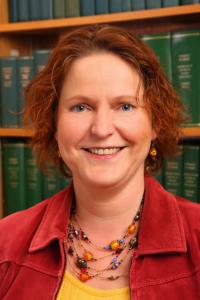Anne van den Nouweland

Statement
Anne has lived and taught in Australia, Europe, and the US. She incorporates her experiences and the cultures in the various countries into examples to illustrate alternative ways of organizing societies.
Anne enjoys hiking in the mountains and on the coast. She also sings in a community choir.
Professor van den Nouweland has been teaching at the UO since 1996.
Education
- Ph.D., Game Theory, Tilburg University, 1993
- Doctoraal (Master’s Degree), Mathematics, Nijmegen University, The Netherlands, 1989
- Propaedeuse (Undergraduate Degree), Mathematics, Nijmegen University, The Netherlands, 1984
Research
Professor van den Nouweland researches game theory, something she describes as a “toolbox filled with models and solutions that can be used to find answers to a large variety of questions. These questions stem from situations in which people, firms, and organizations interact.”
“Mostly, my research is related to studying different ways in which the spoils generated by cooperation can be divided among the participants. I think about what characteristic (for example, treating similar contributors similarly, or making sure that no one is made worse off by contributing to the greater good) a method should have, and whether a method can be constructed that satisfies a list of desirable characteristics. This is called the ‘axiomatic method.’ “
“I have applied this the axiomatic method to many situations ranging from finding a mechanism to change the incentives of fishermen such that they benefit from not overfishing common fisheries, to studying the ways for determining appropriate levels of goods and services that are enjoyed by many people at once.”
“I also have a large body of work that is related to studying (the formation of) networks and/or coalitions between people or firms in which I concentrate on (properties of) methods to distribute the gains from alliances formed and how these influence the networks that are formed.”
Van den Nouweland adds, “I am passionate about the power of theory and mathematics as a tool for gaining a better understanding of how the world around us works. I work very hard in my classes to also try and make my students look beyond the symbols and see the meaning of the mathematics that are used in the models. It is like learning a foreign language: Most ideas in microeconomics and game theory can be expressed in English (or any other language), but it is hard to do this at the level of accuracy needed to prevent possible misinterpretations. Mathematics is a language that is especially suited for use in theory, when one has to express ideas and relations very carefully, and small inaccuracies can have a big impact on the results.”
Teaching
- Game Theory
- Microeconomics
Publications
- Social and Economic Networks in Cooperative Game Theory, Co-Author
- “An axiomatic characterization of the position value for network situations”
- “Share equilibrium in local public good economies”
- “Axiomatizations of the Euclidean compromise solution”
- “A mechanism for inducing cooperation in non-cooperative environments”
- “Values for strategic games in which players cooperate”
- “Demonstrating worker quality through strategic absenteeism”
- “Strongly stable networks”
- “A game theoretic approach of problems in telecommunication”
